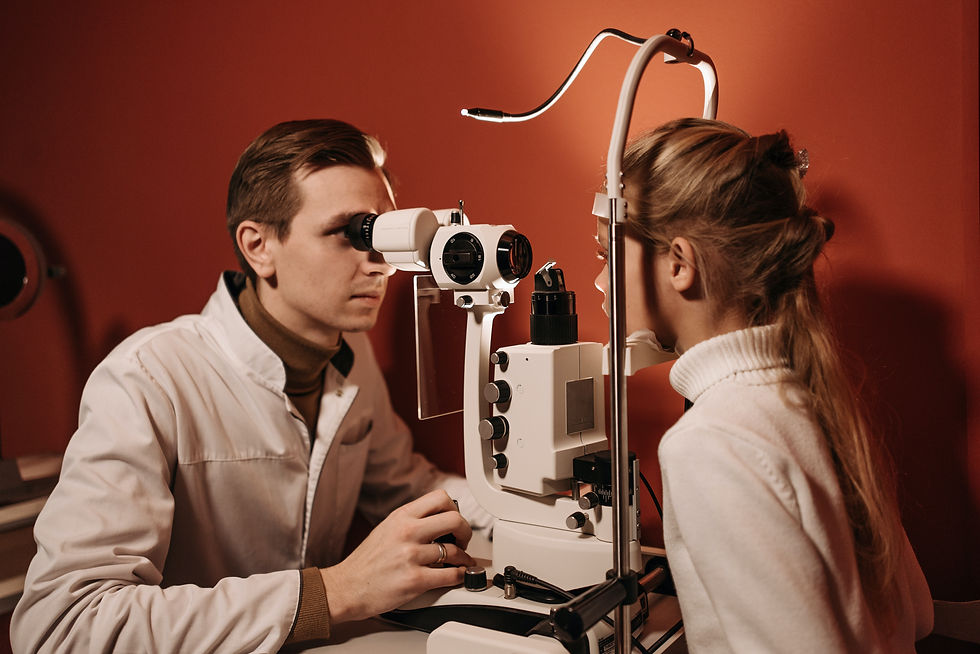Optometrist vs. Ophthalmologist: What’s the Difference?
- Paul John Salazar
- Jan 25, 2023
- 4 min read
Key takeaways:

Do you need to see an ophthalmologist or an optometrist for your yearly eye exam? Which one should you select, and what makes them different? What you require will determine the response.
Optometrists
Doctors of optometry are optometrists. They finished a four-year undergraduate degree and a four-year optometry training course of study. Most optometrists enter practice when their schooling is complete, however others continue on for specialized training.
Generally speaking, optometrists are thought of as primary care physicians and the guardians of your eye health. Among the services that optometrists offer are:
Performing comprehensive eye exams
Diagnosing common eye problems
Prescribing corrective lenses, including contact lenses
Treating minor eye injuries
Optometrists may also write prescriptions for drugs in several states. An optometrist may recommend a patient to a specialist optometrist or an ophthalmologist, depending on the seriousness of the eye condition or damage.
Optometrists have a wide range of specialties in the field of eye care, including:
Pediatric optometry
Geriatric optometry
Vision rehabilitation
Brain injury rehabilitation
Glaucoma
Ocular diseases
Ophthalmologist
Either a doctor of osteopathic medicine (DO) or an MD will qualify as an ophthalmologist (DO). This denotes that they have successfully finished four years of medical school in addition to a four-year college degree. Additionally, they will have finished a four-year residency program where they learned about general medicine and eye disorders. They get knowledge of eye surgery at this time as well. Some pursue additional training known as a fellowship to concentrate on particular eye conditions.
Ophthalmologists do give annual exams, but they primarily focus on more advanced eye treatment.
Conditions treated by both optometrists and ophthalmologists
Optometrists and ophthalmologists treat some similar eye conditions. Who you see depends on how severe the problem is, with whom you feel more comfortable, and who you have access to where you live.
Near- and far-sightedness
Vision problems such as nearsightedness (myopia) and farsightedness (hyperopia) are the most common reasons to see an eye doctor. Both optometrists and ophthalmologists can diagnose these conditions and prescribe corrective lenses (eyeglasses or contacts), but some ophthalmologists don’t if they work in more specialized areas of eye care. It’s best to ask the ophthalmologist’s office if the doctor provides this service before making an appointment.
Eye conditions
Optometrists may be the first to diagnose an eye condition and start treatment before sending someone to see an ophthalmologist. Optometrists and ophthalmologists work together to treat eye conditions like:
Dry Eye
Glaucoma
Macular degeneration
Cataracts
Uveitis
Retinal detachment
Diabetic retinopathy
Optic nerve disease
Strabismus (cross-eye)
When is it better to see an ophthalmologist?
For eye care, it is occasionally necessary to visit an ophthalmologist first.
For instance, if any of the following apply to you:
Possess more severe or intricate eye problems
Need for specific tests to identify eye issues
Require eye surgery, such as LASIK and cataract surgery
Have medical illnesses including diabetes, high blood pressure, or autoimmune diseases that can also lead to eye difficulties
Some eye conditions are only prevalent in youngsters.
Reconstructive surgery is required to address issues with the structures surrounding the eye
Experiencing a sudden change in eyesight
Sudden changes in eye symptoms
Always seek medical assistance if your vision changes suddenly and noticeably. Make an appointment with an ophthalmologist if you experience any of these eye symptoms:
Distorted vision
Decreased or blurry vision (even if temporary)
Double vision
Excessive tearing
Loss of peripheral (side) vision
Halo (color circle) around vision
New floaters (black circles) or flashes of light in vision
Accessing eye care
Where you live and whether or not you have healthcare coverage may also play a role in whether you see an optometrist or ophthalmologist for your eye health.
How do optometrists and ophthalmologists work together?
The first line of defense for your eye health is an optometrist. They can offer assistance with common eye disorders and can advise you when to visit an ophthalmologist. Optometrists and ophthalmologists frequently collaborate in the same office.
Studies have demonstrated that collaboration between ophthalmologists and optometrists can improve the quality and efficiency of care. According to one study, ophthalmologists and optometrists can use healthcare resources more effectively by cooperating, which is advantageous for everyone. Reducing unnecessary visits to ophthalmologists allows them to be available to assist patients who require more specialized eye care. Projects like ECHO (Extension for Community Healthcare Outcomes), in which optometrists learn from one another and ophthalmologists, help reduce unnecessary visits to ophthalmologists.
How does an optician fit into the eye-care team?
Typically, an optician will be the eye care team member you interact with first and last. They frequently assist in scheduling appointments and engage in customer service. They can interpret the prescriptions provided by the optometrist and ophthalmologist so you can receive your glasses because they are also experts in eyewear. Although there are many levels of training for opticians, the majority have received training, earned an optician certificate, or have finished an apprenticeship with an optometrist or ophthalmologist.
The bottom line:
Your eye health is ensured by both optometrists and ophthalmologists, and who you see depends on your needs. A general eye exam and prescription for glasses should be done at an optometrist. If you require specialized treatment or surgery, an optometrist might recommend that you see an ophthalmologist. This partnership may save money while giving your eyes the best treatment possible.

Comments